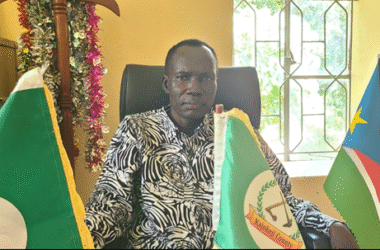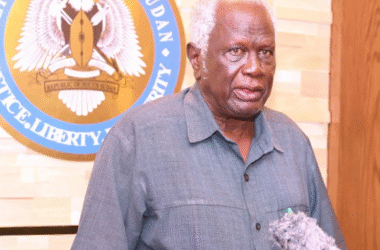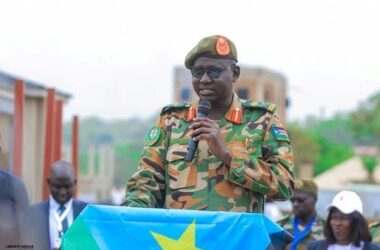By Kei Emmanuel Duku
For many visually impaired individuals in South Sudan, daily life has long presented a daunting landscape of unseen obstacles, profound dependence, and often, isolation.
Navigating bustling, unpaved streets, avoiding open drains, or even simply walking to a nearby market without assistance seemed an insurmountable challenge.
However, a simple, often overlooked tool – the walking cane – is quietly proving to be a revolutionary game-changer, unlocking unprecedented levels of independence and dignity.
Before the widespread recognition and distribution of these essential aids, visually impaired South Sudanese were largely confined to their homes or entirely reliant on family members or friends for every movement.
This dependence limited their access to education, healthcare, and economic opportunities, effectively side-lining them from active community life. The fear of falls, injuries, or getting lost was a constant companion, breeding a sense of vulnerability.
Rejoice Aziza’s story is a testament to this transformation. Aziza, who lost her sight in March 2010 due to a preventable illness that began with itching in her eyes, refused to let her visual impairment define her. At just 14, she started a small business near her father’s home in Juba selling bread, groundnuts, biscuits, fruits, and vegetables. As her business expanded, she ventured into the honey trade, transporting it from her village Mundri, Western Equatoria State.
She vividly recalls that in 2022, a full bucket of honey cost 30,000 South Sudanese Pounds, yielding a profit of 65,000 South Sudanese Pounds upon sale. “After relocating to Malisha main Market, my business expanded rapidly,” Aziza shared. “I have now changed my business from a market vendor; I now own a restaurant and employed 3 people working, and this has given me the opportunity to enrol for further studies.”
Beyond her restaurant, Aziza proudly owns a plot of land she purchased in 2021 for 300,000 Pounds in the Jebel Tamin residential area, which she has since developed.
Despite her remarkable entrepreneurial spirit, Aziza faced numerous challenges. She encountered customers giving her torn currency, while others would leave her restaurant without paying, taking advantage of her inability to see them. In school, before receiving her white cane, navigating the rough terrains from Gudele Two to Buluk School for the Blind was a significant hurdle.
Yet, Aziza never gave up on her education. She diligently uses a Braille machine at school. Throughout her life, the bright young Aziza spent much of her time with nuns at a church. However, when she became blind and returned to her parents, her venture into hawking transformed her family’s circumstances, compelling her to buy and develop her own land, leading to her independence.
She expressed gratitude to the traffic police in Juba for consistently assisting visually impaired individuals during traffic jams.
Aziza credits the walking cane with profoundly transforming her life. “Before, I could not do any kind of business, including going to school,” she said. “However, when I got my white cane from the South Sudan Association of the Visually Impaired, it gave me more courage to complete my primary education, and now I’m enrolled for secondary school.”
She also highlighted the dangers many visually impaired individuals face even with the white cane “Some of my friends have found themselves in terrible accidents; this is because many drivers in Juba don’t know the use of the white/walking canes,” Aziza stated. “This stick-walking cane is like my/our saviour, however, it pains my heart when these walking canes are broken by someone driving a car or riding a motorcycle.”
Silvas Darago another South Sudanese visually impaired, whose journey began with “Trachoma,” an eye infection that gradually stole his sight. He recalls hawking bread as a child when his vision was still clear. After losing his sight, Darago joined an organization for the blind in Juba, where he acquired skills and knowledge in “Acupressure,” a massage therapy service offered in Buluk, Juba.
Darago was among five fortunate South Sudanese individuals trained for four and a half months by a British national to provide massages. Their clients often flock to the Buluk blind association centre in the evenings after work and on weekends for these services.
He recounted that the 2013 training involved one month of human anatomy and the remaining time dedicated to massage techniques. However, the December 15, 2013, conflict in Juba disrupted their plans before they could fully establish their business. They resumed operations after the conflict subsided.
“Many of our clients were European and other foreign nationals in Juba,” Darago recalled. “When the management of Buluk Eye saw our business progressing, they terminated our rent contract. With the grace of God, we found another place inside St. Joseph Parish for 200 Pounds monthly, which was a reasonable price then.”
Working as a massage therapist at the Association of the Blind, Darago’s payment is calculated hourly, and he is paid at the end of each month. The association also introduced monthly savings for the five trained staff offering massage services at the centre.
“No other massage centre in Juba offers the Japanese massage style, which is why many Europeans prefer us,” he explained. “The Japanese massage style is like a pain reliever and relaxer, and Europeans enjoy it.”
Despite his visual impairment, Darago persevered. After earning income from his massage business, he completed his secondary education and went on to graduate from Juba University with a Bachelor’s degree from the College of Arts and Humanities, Department of Sociology. Currently, he works as a visually impaired teacher at Rajaf Educational Centre School of the Blind and part-timer at the Association of the Blind-Massage Centre.
Darago now at 45, highlighted the opportunities offered by walking canes or white sticks, yet he noted a high level of stigma, particularly among young visually impaired girls. They often fear being called “Abuba,” an Arabic word loosely translated as “old woman,” which, he says, has led them to cause accidents on the roads.
“Whenever they (young girls) are told to use the white canes, they don’t want to,” Darago explained. “Many of them instead fold the walking canes and put them in their handbags. This sticks—the white cane—is a sign of independence because it is your eyes. You cannot give someone a hard time to show you direction or the way. Precisely, it is a sign of independence.”
For Mama Faiza Agolia, a mother of five, and 2021 marked the beginning of a profound change. Too much blowing sand entered her eyes, initiating a battle for her sight. Despite on-going treatment, by 2023, she had completely lost her vision.
Mama Faiza, who used to earn a living vending residual goods in the Hia Seminary area, said her business collapsed after her sight deteriorated, as all her money went towards medical treatment. The financial strain was so severe that her third son, who was pursuing a laboratory course, had to drop out of school because she could no longer afford his tuition fees.
“The walking cane is a game changer for me,” Mama Faiza declared. “Now I can cook, wash my clothes, and even access restrooms without the support of my children.”
Before she started using the white/walking cane, Mama Faiza had no prior knowledge of how to use a walking stick. Fortunately, she was among 30 visually impaired beneficiaries trained by the South Sudan Association of the Visually Impaired (SSAVI), a local organization dedicated to supporting visually impaired individuals in South Sudan.
“The white cane has various uses,” Mama Faiza explained. “It can be used for determining the depth of potholes, terrains, and physical obstacles like vehicles while crossing the roads. For example, if your road is full of holes or stagnant water, the white cane can help you know the safe direction to take, whether left, right, or forward.”
Despite the various advantages the white cane offers, Mama Faiza highlighted the significant challenges faced by both visually and hearing impaired individuals, particularly when seeking health services in government facilities. They are often left unattended by health workers and support staff who should be guiding them through the various hospital departments.




